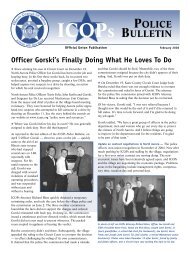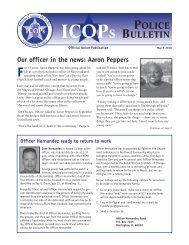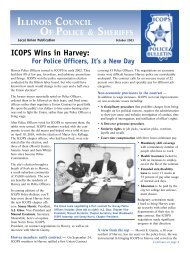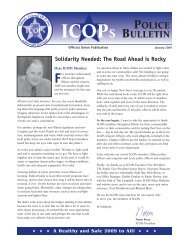*ICOPS - Illinois Council Of Police
*ICOPS - Illinois Council Of Police
*ICOPS - Illinois Council Of Police
You also want an ePaper? Increase the reach of your titles
YUMPU automatically turns print PDFs into web optimized ePapers that Google loves.
Post-Traumatic Stress Disorder and your safetyby Sam Stratton, ICOPs Vice-PresidentThe threat to a police officer’s safety is something weare all aware of. It is beaten into our head from Day 1of academy training. We are taught that nothing is“routine” and to always be aware of our surroundings.We know the threats we face and are willing to suit upevery day and face them.As of late, we’ve all heard disturbing headlines suchas <strong>Of</strong>ficer killed by Iraq War Veteran, <strong>Of</strong>ficer assaultedby Veteran with PTSD, or <strong>Police</strong> take Veteran intocustody after standoff.As a Combat Veteran, I know and understand what someof these Veterans are feeling. They spend the better partof their military careers learning how to positively identifya threat and what to do when they find it. All the whilethere are explosions rattling their teeth and bullets flyingaround them. Now, they come home and are supposed to“turn it off,” they’re supposed to “act normal.”Combat Veterans also learn to never, under any circumstance,run over anything in the roadway. I’ve been homefrom Iraq for five years now, and the hair on the back ofmy neck still stands up if I have to drive over a manholecover or run over any debris in the roadway.As a police officer observing these actions you may conducta traffic stop based on erratic driving. Be aware andlook for signs of military service, such as a specializedplate, a bumper sticker, or military-type clothing.As police officers we have to deal with the everincreasingnumber of Combat Veterans who have somesort of Post Traumatic Stress Disorder (PTSD). SomeCombat Veterans will seek help, while others try todeal with it themselves.Make no mistake; these are not the “everyday citizens”we’re dealing with. All Combat Veterans have beentrained to kill. They may not have had a job in themilitary that required them to do so, but at one time intheir military careers they were taught to shoot, move,and communicate.I encourage my fellow brothers and sisters in lawenforcement to seek out training in how to deal withVeterans. The Justice Department has started programsaround the country to train law enforcement in dealingwith Combat Veterans (see left below). I encourageall of you to learn about PTSD and how to deal with it.Above all, Be Safe, and go home to your loved onesat the end of each shift.Where to start looking for helpIn January 2012, DOJ began funding a national trainingprogram to help police deal with an increasing numberof volatile confrontations involving highly-trained andoften heavily armed combat veterans.Developers of the program said in their announcement thatan “urgent need” exists to de-escalate crises in which evenSWAT teams may be facing tactical disadvantages withsuspects who are trained in modern warfare.No data is yet available that specifically tracks police confrontationswith suspects currently or formerly associatedwith the military. But we know the volume of violentincidents involving military personnel off base has risen toa higher level than we’ve seen before. The training offeredthrough DOJ grants represents one piece of the challenge indealing with an increasing number of combat veterans.You’ll find more information at the following websites:• U.S. Department of Justice, CommunityOriented Policing Services — cops.usdoj.gov• U.S. Department of Veterans Affairs — ptsd.va.gov• National Institute of Mental Health — nimh.nih.gov• Upper Midwest Community Policing Institute — offersa course in “Public Safety De-Escalation Tactics forMilitary Veterans in Crisis” — umcpi.orgICOPsVice-PresidentSamStrattonSam Stratton, ICOPs Vice-President, joinedthe Winthrop Harbor <strong>Police</strong> Department as acommunity service officer in 2001. He becamea police officer upon graduating from theacademy and is part of the Lake County MajorCrimes Task Force.For 14 years, Sam served in the U.S. ArmyReserves and was activated twice, once to Iraq.He has received multiple awards, includingthe Purple Heart.OCTOBER 2012 | ICOPs 5










